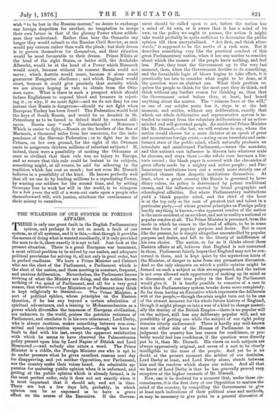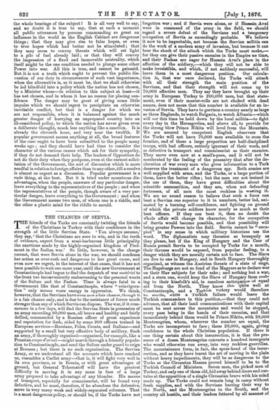THE WEAKNESS OF OUR SYSTEM IN FOREIGN AFFAIRS.
THERE is only one great fault in the English Parliamentary system, and perhaps it is not so much a fault of our system, as of all systems, and it is this,—that though it provides the means of doing what is wanted excellently, if it only provided the men to do it, there exactly it is apt to fail. Just look at the present situation. There is a great European war imminent, a most critical problem to be solved by our nation, and adequate political provisions for solving it, all not only in good order, but in perfect readiness. We have a Prime Minister and Cabinet who are the elect of the Parliament, a Parliament which is the elect of the nation, and these meeting in constant, frequent, and anxious deliberation. Nevertheless, the Parliament knows nownq of what the Ministry are doing, and the nation knows nothing of the mind of Parliament, and all for a very good reason, that whatever oither Ministers or Parliament may think is kept religiously to themseire... milA Prime Minister, a sort of political sphinx, whose principles on the Eastern Question, if he has any beyond a certain admiration of spiritual adventurers, and a leaning to Mohammedanism as a power which diversifies the tameness of European civilisation, are unknown to the world, praises the patriotic reticence of Parliament, and emulates it in his own utterances ; Lord Derby, who is always cautious, makes something between non-com- mittal and non-intervention speeches,—though we have no fault to find with his last, except the apparent satisfaction with which he seems to have observed the Palmerstonian policy pressed upon him by Lord Napier of Ettrick and Lord Hammond ;—and nobody else utters a word. The Prime Minister is a riddle, the Foreign Minister one who is apt to do under pressure what he gives excellent reasons next day for disapproving, and yet neither Opposition, nor Parliament, nor the country make their voices heard. An admirable ap- paratus for maturing public opinion when it is unformed, and getting at the public opinion which is already formed, is in the most perfect order, only it does not act exactly when it Is most important that it should act, and act in time. There are but a few days left, probably, in which opinion can be so expressed as to have a grave effect on the course of the Executive. If the Govern- ment should be called upon to act, before the nation has a mind of its own, or is aware that it has a mind of its own, on the policy we ought to pursue, the action it might take would probably be quite sufficient to determine the public opinion till then uncrystallised. " Act first, and think after- wards," is supposed to be the motto of a rash man. But it describes something very like the practical conduct of this great Parliamentary nation, when it has any matter to consider about which the masses of the people know nothing, and feel less. First, they trust the Government up to the very last moment, then, when the Government decides to do something, and the formidable logic of blows begins to take effect, it is practically too late to consider what ought to bo done, as if the question were an abstract one. What their position re- quires the people to think, for the most part they do think, and think without any further reason for thinking so, than that the Government acted before they, at least, had heard anything about the matter. The " ruinous force of the will," as one of our subtler poets has it, steps in at the last moment, and settles, without any deliberation, exactly that which our whole deliberative and representative system is in- tended to extract from the voluntary deliberations of an active- minded and self-governed people. An accidental Prime Minister like Mr. Disraeli,—the last, we will venture to say, whom the nation would choose for a mere dictator at an epoch of great and momentous foreign crisis,—acting on an irresolute and unin- formed state of the public mind, which naturally produces an irresolute and uninformed Parliament,—issues the mandate, and this nation's vast influence is thrown into whatever scale he chooses, and stays there ;—the tabula rasa becomes a his- toric record ; the blank paper is covered with the chronicles of great efforts made by a mighty and active people ; and Par- liamentary institutions turn out a result more strictly one of political chance than despotic institutions themselves. At least, when a great country like Russia is governed by here- ditary rulers, its policy is determined by potent traditional causes, and the influences exerted by broad geographic and ethnological affinities. But where Parliamentary institutions yield a blank popular mind, and the chief of the hour is at the top only as the man of greatest tact and talent in a particular party,—of whose general principles on Foreign policy hardly anything is known,—the apparent resolve of the nation is the mere accident of an accident, and not in reality a national or popular resolve at all. The Prime Minister is presumed, from the mode in which he comes to the head of affairs, to be in some sense the focus of popular purpose and desire. But in cases like the present, he is simply altogether uncontrolled by popular purpose and desire, and left to the liberty of indifference of his own choice. The nation, so far as it thinks about these Eastern affairs at all, believes that England is not concerned in them. Parliament faintly hopes that England may not be con- cerned in them, and is kept quiet by the mysterious hints of the Minister, of danger to arise from any premature discussion. And so the only elements on which a public opinion might be formed on such a subject as this are suppressed, and the nation is not even allowed such opportunity. of making up its mind as a discussion of our true policy in the East by Parliament
would give it. It is hardly possible to conceive of a case in which the Parliamentary system breaks down more completely. So far from having an ExecutivA which represents the deliberate will of the people,—though the crisis might turn out to be one of the utmost moment for the whole future history of England, though it might plunge us into a war of a kind to change materi- ally the destiny of the British Empire—there is no popular will on the subject, still less any deliberate popular will, and no possibility of getting one while the subject of our right policy remains utterly undiscussed. There is hardly any well-known man on either side of the Houses of Parliament in whose judgment the country has less reason for confidence, or pro- bably would feel less confidence, if the question were directly put to it, than Mr. Disraeli. His views on such subjects are always oppressively original, and never of a sort to be clearly intelligible to the mass of the people. And yet he is no
doubt at the present moment the arbiter of our destinies. Lord Derby at least, and Lord Derby alone, stands between him and the resolves which shape our action. And all that we know of Lord Derby is that he has generally proved very receptive of the higher counsels of Mr. Disraeli. Now, can it be doubted for a moment that, under these cir- cumstances, it is the first duty of our Opposition to mature the
mind of the country, by compelling the Government to give at least such indications of their political aims and methods, as may be necessary to give point to a general discussion of
the whole bearings of the subject ? It is all very well to say, and no doubt it is true to say, that at such a moment all public utterances by persons commanding so great an influence in the world as the English Cabinet are dangerous things ; -that they may give rise to false hopes, or even to true hopes which had better not be stimulated ; that they may seem to convey threats which will set light to a pile of fuel already laid ; or that they will convey the impression of a fixed and immovable neutrality, which itself might be the one condition needed to plunge some other Power into war. All this is true, and cannot be gainsaid. But it not a truth which ought to prevent the public dis- cussion of our duty in circumstances of such vast importance, when the alternative is, as it must be, that we shall otherwise be led blindfold into a policy which the nation has not chosen, by a Minister whom—in relation to this subject at least—it has not ohosen, and in whom it has no reason for placing con- fidence. The danger may be great of giving some little impulse which we should regret to precipitate an otherwise inevitable conflict, but that is a danger for which we are not responsible, when it is balanced against the much greater danger of hurrying an unprepared country into an ill-considered policy, to which the nation has never given even a deliberate thought, much less anything like a sanction. It is already the eleventh hour, and very near the twelfth. If popular government means anything at all, the broad features of the.case ought to have been submitted to the people many weeks ago ; and they should have had time to consider the character of the various causes which ask for their sympathy, if they do not demand their help. The leaders of Opposition do not do their duty when they postpone, even at the earnest solici- tation of the Government, the sort of discussion which is more needful in relation to foreign affairs than to any other, till a resolve is almost as urgent as a discussion. Popular government is a rude thing, at the best. But it is tried under monstrous dis- advantages, when the people, unaware of any particular danger, leave everything to the representatives of the people ; and when the representatives of the people, though aware of a very par- tioular danger, leave everything to the Government ; and when the Government means two men, of whom one is a riddle, and the other a plastic mind for the riddle to mould.



































 Previous page
Previous page